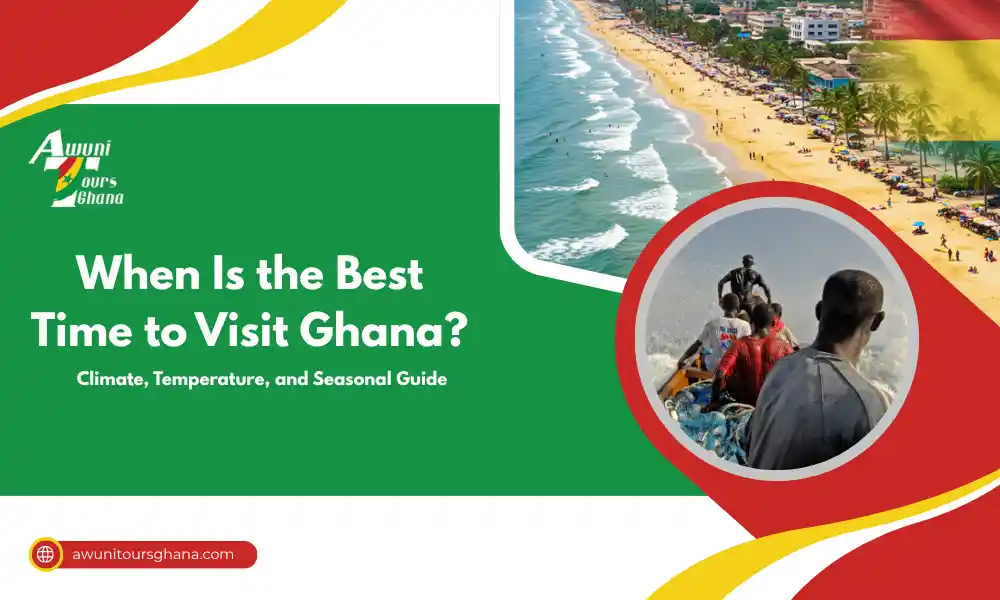Ghana is a place that stays warm all year and welcomes visitors with open arms. From golden beaches and buzzing markets in Accra to national parks full of wildlife, there’s always something to see. But the weather changes from month to month, and knowing the right time to visit can make your trip smoother and more fun.
In this guide, you’ll find out the best time to visit Ghana, what the weather is like each month, and when festivals and wildlife are at their best. Whether you’re looking for dry days, cooler nights, or local celebrations, this seasonal guide covers it all.
A Month-by-Month Guide on When to Go to Ghana
Ghana is a warm, vibrant country with different travel experiences throughout the year. Whether you’re visiting for sunny beach days, colourful festivals, or quiet nature escapes, each month offers something unique. This seasonal guide breaks down the climate, temperature, and key events on a month-by-month basis.
December to March – Best for Festivals, Wildlife, and Sunshine
This is the best time to visit Ghana Africa if you want dry days, great roads, and exciting events. These months are part of the dry season, with little to no rain. Travel is easier, and the weather feels cooler (though still warm) due to the Harmattan winds, which bring dry, dusty air blowing in from the Sahara.

December is a favourite in Accra, with festivals like Afrochella bringing music, food, art, and dancing. Locals say this is the best time to visit Ghana, especially to explore the coast, enjoy the nightlife, or relax on the beach.
If you’re coming during this peak season, don’t miss our Ghana Packing Checklist, so you’re fully prepared for warm days and cultural events.
If you love animals, plan a trip between December and March. This is the best time of year to visit Ghana for wildlife viewing. In places like Mole National Park, elephants and other animals gather around watering holes, making them easier to spot.
April – Light Rain Begins
April marks the beginning of the rainy season, mostly in southern Ghana. It’s still warm, but rain can fall in the afternoon. If you’re okay with a bit of rain, April is a peaceful time to travel with fewer crowds. It’s a calm start to the rainy season, and everything begins turning green again.

If you’re traveling to Ghana for the first time, this month gives you a nice mix of sunshine and greenery.
May – Heavy Showers Begin
May sees more consistent rainfall, particularly in the south. Expect heavy showers that might last for a few hours. Roads in the countryside can get muddy or flooded, but many areas are still reachable.
Tourism slows down during this time, so if you’re looking for quieter experiences and lower prices, this could work in your favour. Just come prepared with waterproof shoes and light rain gear.

It’s a good time to visit the best places in Ghana, especially indoor or cultural sites like museums, palaces, and historic forts.
June – Lush, Green, and Rainy
June is a full-on rainy month in the south. It rains often, but the country looks beautiful. If you don’t mind a few wet days, you’ll enjoy how fresh and green Ghana becomes.

The Ghana temp stays warm, around 26°C to 30°C. It’s a lovely time for people who enjoy nature and don’t need perfect weather every day.
July – Short Dry Break in the South
July gives a short dry break in southern Ghana. There’s still some rain, but it’s less intense. Travel gets easier, and it’s a nice month to explore the coast or go shopping in Accra’s busy markets.

Photography is better this month too, fewer cloudy days and lots of life around.
August – Still Dry in the South, Rainy in the North
August is a mix. The south stays a little dry, while the north like Tamale sees more rain. If you remain in the southern cities, it’s a good time for beach trips and day tours. The humidity is lower than in the rainy months.
This is a nice time for travellers who want to explore and still enjoy dry weather.

August is a great time for cost-conscious travellers—fewer crowds often mean better deals on flights and accommodation. If you’re curious about trip expenses, check out our guide on Ghana travel costs to plan smart and stretch your budget.
September – Rains Return
In September, the rain comes back, especially in southern Ghana. It’s still hot and humid, and you’ll see more thunderstorms. Roads may be slower, but the views are amazing. Trees and plants are at their greenest.

If you want peace, this is a great month to visit with lower prices and fewer crowds.
October – End of the Rain
October marks the end of the rainy season in the south. Showers happen, but they don’t last long. Travel is easier, and the average temperature in Ghana stays between 25°C and to 31°C.

You’ll still enjoy greenery, but without too much rain. It’s a good time to take day trips and explore smaller towns.
November – Dry Season Starts Again
November is the start of the dry season. The Harmattan returns, so the air becomes drier, and the skies can appear dusty. But it’s easier to travel again, especially if you’re heading to Mole National Park or planning safaris in the north.

November is perfect if you want sunshine without the holiday rush. It’s a quiet, warm month, ideal for early travellers.
Best Time to Visit Ghana Based on Your Travel Plans
- For festivals, sunshine, and easy travel: December to March is the best choice.
- For green landscapes and fewer crowds: Consider April to July.
- For quiet travel before the high season: October and November offer great balance.
- For wildlife spotting and nature: Plan your trip between December and March.
No matter when you go, the Ghana climate is warm and welcoming year-round. Just check the forecast, pack for the season, and enjoy everything this beautiful country has to offer.
Conclusion:
Ghana isn’t just a place, it’s a feeling. Whether you’re chasing music in the streets of Accra, spotting elephants in the wild, or enjoying calm coastal evenings, the timing of your trip can shape your entire experience.
If you’re someone who loves sunshine, local culture, and smooth travel days, Visit Ghana is when the skies are dry and the festivals are in full swing. But if you’re curious about green landscapes and a quieter atmosphere, the rainy season has its charm too.
FAQs
What is the hottest month in Ghana?
March is the hottest month in Ghana. Temperatures nudge 30°C on the south coast but can top 40°C further north.
What is the climate like in Ghana?
The Ghana climate is tropical, which means it’s warm all year round. The country has two main seasons: a dry season (from November to March) and a rainy season (from April to October). The Harmattan winds in the dry season bring cooler, dusty air, especially in the north.
Is Accra weather different from other parts of Ghana?
Yes. Accra weather is slightly more humid and coastal. The north (like Tamale) is usually drier and hotter. Rain starts earlier in the south and ends later than in the north.
Can I visit Ghana during the rainy season?
Yes, but be prepared for short heavy rains, especially from May to June. The scenery is beautiful and green, and there are fewer tourists, making it a peaceful time to explore.
What’s the best time to go to Ghana for wildlife?
If you want to see animals like elephants, antelope, and monkeys, the best time to go to Ghana for wildlife is during the dry season from December to March. It’s easier to spot animals around watering holes.

